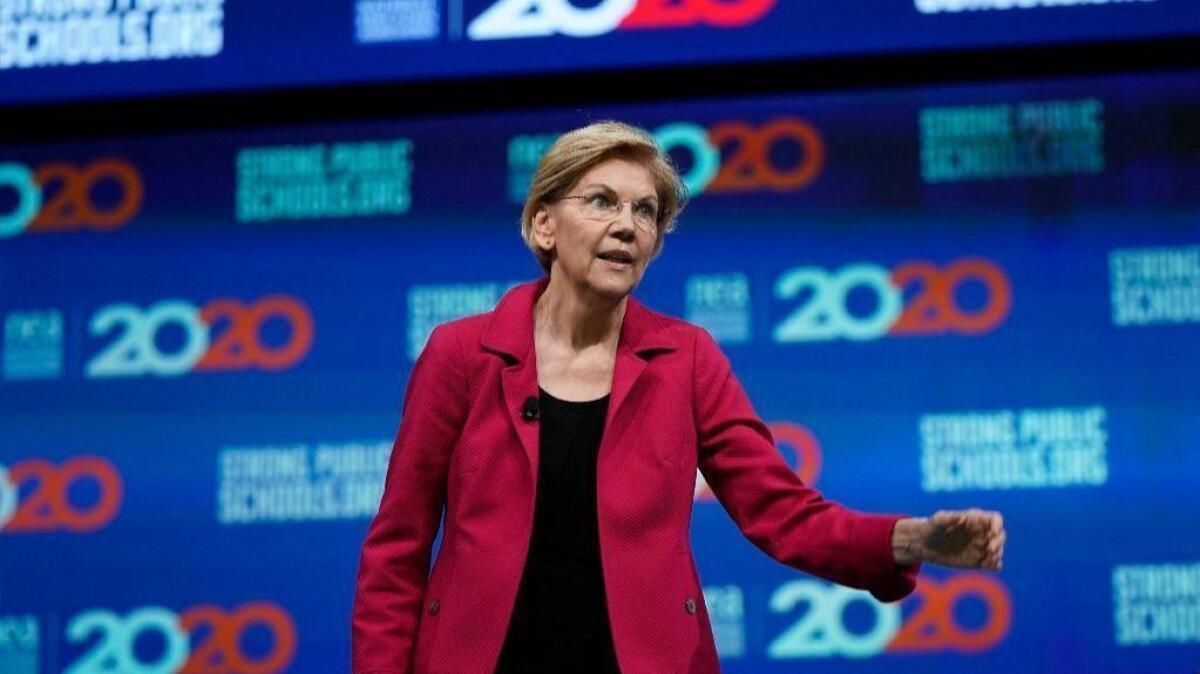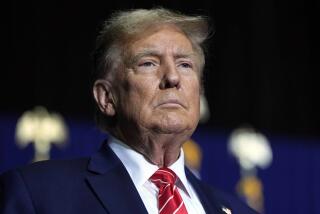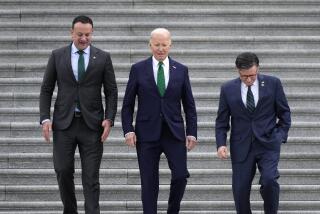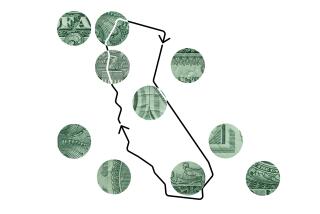Elizabeth Warren out-raises Harris, Sanders — turning momentum into money

Sen. Elizabeth Warren of Massachusetts raised $19.1 million for her 2020 presidential campaign in the last three months, more than tripling the amount she raised in the first quarter of 2019 — a strong showing of her ability to turn her campaign’s gathering momentum into more robust fundraising even as she forswears high-dollar donors.
Warren was the last of the top 2020 Democratic hopefuls to reveal her fundraising total. She brought in less than the amount raised by Pete Buttigieg, the South Bend, Ind., mayor who looks to be the top fundraiser in the field with $24.8 million collected in the last three months, and former Vice President Joe Biden, who raised $21.5 million in a little less than three months.
But Warren out-raised two other key rivals for the Democratic nomination: Sen. Bernie Sanders of Vermont, who raised $18 million and is competing with her for support from the party’s left wing; and Sen. Kamala Harris of California, who raised nearly $12 million and, like Warren, has been gaining momentum since the first Democratic candidate debates.
The release of fundraising information from the second quarter, which ended June 30, and a recent spate of polling have helped clarify a top tier of Democratic candidates in the aftermath of the first round of debates two weeks ago.
Biden’s strong showing in fundraising quelled concerns that his rusty political network might not be up to the demands of a 21st century campaign. But his dwindling edge in recent polls shows his front-runner status is fragile.
Buttigieg, a newcomer, has proved himself a strong fundraiser, but that has not yet lifted him in the polls. Harris is in the opposite situation: Her poll standing has improved, but her fundraising has continued to lag.
Meanwhile, Sanders’ donations remained unchanged and his polls have dropped, suggesting he is having a hard time reaching beyond his loyal base.
Warren’s second-quarter report was keenly anticipated as a sign of whether her decision to forswear high-dollar fundraisers would make her financially noncompetitive. Only Sanders has made a similar pledge. For both candidates, the policy was in keeping with their central campaign message that monied special interests and the wealthy have too much power in the U.S. economic and political system.
“You’re making it possible to build a presidential campaign without catering to wealthy donors,” Roger Lau, Warren’s campaign manager, said in an email to supporters announcing the new fundraising totals.
Warren seems to be reaping the benefits of a policy-heavy campaign focus, which has given her a distinctive brand in a crowded field, consistent media attention and won her praise for campaigning on substance, not flash. Spending less time in high-dollar fundraisers, her aides say, has also left her free to spend more time in grassroots campaign events, sometimes surprising small donors with thank you calls.
Warren has been under heavy pressure to improve her fundraising to cover the high cost of maintaining her big payroll. Her campaign staff has grown to more than 300, with 60% of it in Iowa and three other early-voting states. That is up from 160 in the first quarter. It gives her almost unmatched organizing strength, but also saddles the campaign with big costs.
Her campaign said it ended the second quarter with $19.7 million in cash-on-hand, short of the $22.6 million the Buttigieg campaign said it had in the bank and the roughly $30 million the Sanders campaign says it has.
Warren announced in February that she would not hold fundraisers, dinners or other special events for wealthy donors. That was a controversial decision because it cut her off from some of the more efficient ways of raising money in large chunks.
Her finance director at the time, Michael Pratt, quit the campaign in part because of the decision. Her first-quarter fundraising -- just $6 million -- was lackluster and far below the sums raised by her competitors, including Sanders, who raised $18 million in the first three months.
Biden and Buttigieg have not sworn off high-dollar fundraisers, and that has helped them top the field in donations. The Biden campaign, in announcing his total, noted that they had raised their money on a shorter timeline: He did not get into the race until three weeks into the quarter.
But Warren’s smaller haul came from more donors: Her campaign said the $19.1 million came from 384,000 people. Buttigieg’s came from more than 294,000 donors; Biden’s, from more than 256,000. Harris said she had more than 279,000 donors.
The fundraising reports are an important milestone in a long journey to the party’s nomination. One advantage to collecting money in smaller increments rather than in chunks of $2,800, the maximum allowed from an individual, is that small donors can give more than once and so are a renewable resource in a long campaign.
Warren’s campaign said that her average donation size was $28, compared with the $49 average donation collected by Biden, $47.42 by Buttigieg and $39 by Harris. Only the Sanders campaign reported a smaller average donation than Warren’s — $18.
Harris has recently emerged as a stronger rival to Warren, matching and in some cases surpassing her in polls, as the two male front-runners -- Biden and Sanders -- have seen their polling leads narrow.
Harris has been buoyed by her performance in the first round of debates, when she pointedly confronted Biden about his record on school busing and other racial issues. That catapulted her to new notoriety and led to an infusion of $2 million in online donations the day after the debate, her campaign said.
Still, her contributions for the full quarter ended up being slightly less than the $12 million she collected in the first quarter, when she made a splashy entrance as one of the first candidates in the field.
More to Read
Get the L.A. Times Politics newsletter
Deeply reported insights into legislation, politics and policy from Sacramento, Washington and beyond. In your inbox three times per week.
You may occasionally receive promotional content from the Los Angeles Times.







